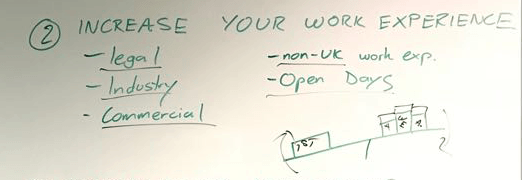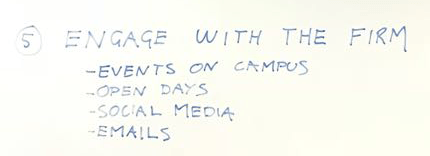Information hub
All the latest views and news here
Training Contract Application Strategies That Work – Whiteboard Wednesday
by Paul Gascoyne, Graduate Recruitment Manager
Video Transcript
Hello and welcome to this edition of Whiteboard Wednesday. This is our first Whiteboard Wednesday, and I’m pretty sure you’ve got an idea of how it’s going to work. It’s going to go out on a Wednesday. We’re going to use a whiteboard, and it’s going to be a series of presentations where we discuss topics, ideas, and give you general training contracts application advice.
And today, we’re going to talk about training contracts application strategies that work. Now, this came about because a few weeks ago, we did a presentation, a Facebook Live with some of our trainees, about how to bounce back from a training contract rejection. And as part of that, we did some research with our trainees, looking at applications that they submitted that had been unsuccessful compared with the applications that were successful. And we identified some key themes – what made an application successful compared to an unsuccessful one. And that’s what I’m going to cover right now.
So the first one is – apply earlier in the recruitment cycle. Now, I don’t want you to get this confused with rolling training contract applications. So a rolling training contract application is really where a law firm advertise the training contract deadline, say it’s the end of July, but they’re screening the applications and interviewing people before the deadline.

What I’m talking about here is law firms generally recruit throughout the recruitment cycle but in periods using, for example, vacation schemes. So you might find there’s a winter vacation scheme, then a spring vacation scheme, then a summer vacation scheme, and then a law firm will look at direct training contract applications.
Now, the point here is that our trainees felt that when they applied earlier in the cycle, so, for example, applying for a winter vacation scheme as opposed to a spring vacation scheme or a spring vacation scheme as opposed to a summer vacation scheme, they were more successful. I think there is some truth in that. I wouldn’t take it as guaranteed that that’s the best strategy, but if you look at all the reasons why an application is successful, I think it’s fair to say that if you apply earlier in the cycle, it might give you a bit of an advantage. So that is the first point, apply earlier in the recruitment cycle, but don’t confuse that with rolling applications and general training contracts application deadlines.
The second point is to increase your work experience. Pretty much all of our trainees said that with their successful applications, they had gained more work experience between the unsuccessful and the successful. So what do we mean by work experience? I mean, you’ve got legal work experience. That’s an obvious one. So we’re talking a day or more in a law firm; it can be commercial, can be high street, could even be a mini-pupilage. Legal work experience generally is very good. But then you’ve got industry work experience and commercial work experience as well. So commercial, we’re talking about a similar environment to a law firm, so professional services, management consultants. They operate in a very similar way. The knowledge is different, but the way that they operate is quite similar.

Industry – think about who a law firm’s clients are. So, many clients are banks, big corporates. If you’ve got some work experience in an organisation that is very similar to a law firm’s clients, that can also be a positive. So it doesn’t always have to be legal work experience. Don’t forget non-UK work experience as well. It doesn’t have to be in the UK. Many international law firms have offices in many, many different countries and different jurisdictions. Getting work experience in a law firm in a different country is also valuable. I wouldn’t say this should be the only type of work experience that you get but open days do count. So if have you gone to a law firm open day, you can put in the work experience section if you want to. But I think a good way to look at this is when you’re building up your application, you’ll have things like your academics, your work experience, your answers to the written questions. And ultimately, these at some point will be good enough for you to get to whatever the first stage is. So the first stage interview, the psychometric test, whatever it is.
So let’s consider this to be first stage. So this might be academics, this might be work experience or it might be your written answers. And if you increase any of these – so more work experience, stronger academics, better research, therefore, better answers – this is going to shift. And if you can build up these, then you got a much better chance of making it past the initial application stage. So your academics might stay as they are. You might have completed your degree, for example, therefore you’re not going to get any better grades, therefore you can increase your work experience or improve your written answers. These can all help, but work experience is vital.
The next one – tailor your application, brackets, but don’t repeat what’s on the website. I see candidates do this quite often with training contract application answers. A bit of advice I used to give when it came to written answers is – if you can take the law firm’s name out that you’re applying to and replace it with another law firm, and that answer would still make sense – it’s going to be too generic. It needs to be specific to that particular law firm.

The mistake that candidates make is just to repeat some things off the website, which could only apply to that particular firm. This is different to really evaluating training contract application questions and answers. When I receive applications, people might think they’re tailoring their application by saying, “Shearman & Sterling has 850 lawyers in 20 different offices specializing in complex corporate work.” That’s not what we mean by tailoring your application. That’s just repeating things back from the website. So when we say tailoring, we actually mean make it specific. Don’t just repeat.
Number four – submit fewer applications. Every trainee said that they submitted fewer applications in the application rounds that they were successful in. I don’t think anyone is really honest with you when they’re initially applying about how many training contract applications they are genuinely submitting. But once people have got training contracts, they can then be honest. Most of our trainees said, initially, they were applying for over 50 vacation schemes or training contracts in one go, which is far too many. And actually, when they were successful, this was definitely fewer than 10. And I think that’s right – that’s the way to go. It’s much better to submit fewer than 10, but make sure they are really tailored, really related to the firm that you’re applying to.

Next up – engage with the firm that you’re applying to. It always seems strange when you see a candidate who is really trying to sell themselves and say that this is the firm that they want to work for, the firm that they have always had ambitions to apply to, and then they haven’t been to any events on campus. They haven’t been to an open day. They don’t engage in or following you on social media. They’re not receiving any newsletters or emails that you’re willing to send out. And then you begin to see that it’s just a blanket application.

So my advice is go to events on campus. Law firms will be doing this extensively throughout October, November. December time typically; try and go. If you can’t make an event on campus, apply for an open day. Follow the law firm on things like Facebook. And that’s not just this idea that law firms are trying to get involved in social media. It’s actually a really good way to relay messages. And you’ll find that some of the most updated information about law firms is communicated on social media. So that’s a really good reason to follow. If you can sign up for newsletters, sign up. You can unsubscribe if you’re unsuccessful or later on in the cycle, but often law firms will provide information via emails as well. So try and engage with the firm first and then you’ll have things to talk about at the interview or on the application form.
And then the sixth one, most law firms will have areas of practice which are very profitable to the firm, which will make up the core practices within the office. So when it comes to your training contract application answers, it makes sense that you are talking about the firm’s practice areas.

So here at Shearman, we specialize in bank finance, project finance, M&A. It makes sense if you are talking about those practice areas in the answer because those are the biggest departments within the firm. And that goes for other firms as well, and that should be the way that you should approach it. Think about the strengths of the firm and talk about those strengths.

And then the seventh one, and people often forget about this, it’s just being able to talk about yourself, relaying why you’re interested in a career in law, why you particularly want to practice as a commercial solicitor. Actually quite basic and fundamental questions, which you should be able to answer, but a lot of candidates fail on that because they struggle to articulate themselves. They think the application is purely talking about everything else, and this is all important, but you also need to be able to talk about yourself.
Okay. So those are the seven training contract application strategies that we identified. Hopefully, that’s helpful. Like I say, some are going be more important than others. Some of them you might not be able to influence, but I imagine most of these you can. So, good luck with your applications.


